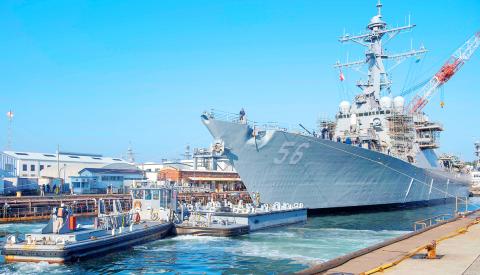China again warned the US against stoking military tensions after two US warships on Wednesday sailed through the Taiwan Strait, the third such show of force this year.
The US sailed an Arleigh Burke-class guided-missile destroyer and a Henry Kaiser-class fleet replenishment vessel through the Strait, according to the US Naval Institute, an independent organization that tracks naval affairs.
China “expressed concern to the US side” over the move, Chinese Ministry of Foreign Affairs spokesman Geng Shuang (耿爽) told a briefing in Beijing yesterday.

Photo: Reuters / US Navy
“The Taiwan issue concerns the sovereignty and territorial integrity of China,” he said.
Taiwan remains the “most important and sensitive issue” in relations between the two superpowers, Geng said, repeating a message delivered to US National Security Adviser John Bolton earlier this month by Chinese State Councillor Yang Jiechi (楊潔篪).
The transit came shortly before talks between Chinese President Xi Jinping (習近平) and US President Donald Trump at the G20 summit in Buenos Aires.
“The frequency of these reported passages is unprecedented,” said Collin Koh Swee Lean, a research fellow at the S. Rajaratnam School of International Studies in Singapore. “I’ll caution to add that these are reported transits, not counting possible unreported ones. Hence it’s hard to draw a full picture.”
It was the first US show of force in the Strait since Saturday’s local elections.
Geng urged the US to abide by its “one China” policy and “properly handle Taiwan-related issues so as to avoid undermining China-US relations and the peace and stability across the Taiwan Strait.”

Conflict with Taiwan could leave China with “massive economic disruption, catastrophic military losses, significant social unrest, and devastating sanctions,” a US think tank said in a report released on Monday. The German Marshall Fund released a report titled If China Attacks Taiwan: The Consequences for China of “Minor Conflict” and “Major War” Scenarios. The report details the “massive” economic, military, social and international costs to China in the event of a minor conflict or major war with Taiwan, estimating that the Chinese People’s Liberation Army (PLA) could sustain losses of more than half of its active-duty ground forces, including 100,000 troops. Understanding Chinese

The Ministry of Foreign Affairs (MOFA) yesterday said it is closely monitoring developments in Venezuela, and would continue to cooperate with democratic allies and work together for regional and global security, stability, and prosperity. The remarks came after the US on Saturday launched a series of airstrikes in Venezuela and kidnapped Venezuelan President Nicolas Maduro, who was later flown to New York along with his wife. The pair face US charges related to drug trafficking and alleged cooperation with gangs designated as terrorist organizations. Maduro has denied the allegations. The ministry said that it is closely monitoring the political and economic situation

UNRELENTING: China attempted cyberattacks on Taiwan’s critical infrastructure 2.63 million times per day last year, up from 1.23 million in 2023, the NSB said China’s cyberarmy has long engaged in cyberattacks against Taiwan’s critical infrastructure, employing diverse and evolving tactics, the National Security Bureau (NSB) said yesterday, adding that cyberattacks on critical energy infrastructure last year increased 10-fold compared with the previous year. The NSB yesterday released a report titled Analysis on China’s Cyber Threats to Taiwan’s Critical Infrastructure in 2025, outlining the number of cyberattacks, major tactics and hacker groups. Taiwan’s national intelligence community identified a large number of cybersecurity incidents last year, the bureau said in a statement. China’s cyberarmy last year launched an average of 2.63 million intrusion attempts per day targeting Taiwan’s critical

AGING: As of last month, people aged 65 or older accounted for 20.06 percent of the total population and the number of couples who got married fell by 18,685 from 2024 Taiwan has surpassed South Korea as the country least willing to have children, with an annual crude birthrate of 4.62 per 1,000 people, Ministry of the Interior data showed yesterday. The nation was previously ranked the second-lowest country in terms of total fertility rate, or the average number of children a woman has in her lifetime. However, South Korea’s fertility rate began to recover from 2023, with total fertility rate rising from 0.72 and estimated to reach 0.82 to 0.85 by last year, and the crude birthrate projected at 6.7 per 1,000 people. Japan’s crude birthrate was projected to fall below six,